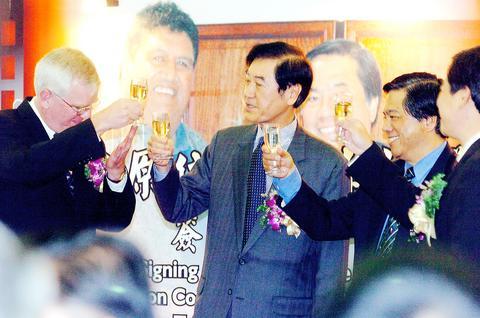Thanks to a new agreement between representative governmental groups, the Maori of New Zealand and the indigenous peoples of Taiwan have officially opened the doors to cultural and informational exchange.
During a ceremony yesterday, representatives from the New Zealand Commerce and Industry Office in Taipei (NZCIO) and the Taipei Economic and Cultural Office (TECO) in New Zealand signed an agreement to cooperate on indigenous issues on behalf of Taiwan's Council of Indigenous Peoples (CIP) and New Zealand's Ministry of Maori Development.

PHOTO: GEORGE TSORNG, TAIPEI TIMES
Although there have been many informal cultural exchanges between the two countries, said CIP chairman Chen Chien-nien (
"There are many health, social and immigration issues that the indigenous people of Taiwan and the Maori share in common," said Charles Finney, the NZCIO director who signed the agreement.
Finney noted there had been much interest from both sides in a formal relationship between the two groups to examine cultural, linguistic and even physical similarities.
For example, Finney said, the agreement will encourage medical research exchanges, possibly opening doors to greater understanding of genetic diseases that the two groups suffer from.
The agreement's stated purpose is to facilitate cultural exchanges and friendly relations between the ethnic groups. The agreement also calls for the establishment of direct contacts between academic, non-profit and tribal entities, and proposes at least one planning meeting between the two representative agencies each year to expand cultural contacts.
The CIP also announced yesterday the establishment of a "working holiday" agreement with New Zealand to allow 400 Aboriginal youths to go to New Zealand for year-long "working holidays." The youths will be allowed to work and/or study part-time while exploring New Zealand. This is the first such arrangement between Taiwan and another country, although New Zealand has similar working holiday agreements with eighteen other countries. Youths must be between 18 and 30 years of age to apply for the program.
Chen said the CIP also plans to set up artistic exchanges between the ethnic groups via the Internet. Through these exchanges, artists and artisans will be able to learn more about and purchase each other's work, he said.
The arrangement is the second international agreement of its kind made by the Council of Aboriginal Affairs. The first was a 1998 memorandum of understanding with Canada's indigenous people through the Canadian Trade Office in Taipei.
NZCIO and TECO representatives also were optimistic about future business opportunities, saying that they hoped the agreement would encourage tourism between Taiwan and New Zealand.

Alain Robert, known as the "French Spider-Man," praised Alex Honnold as exceptionally well-prepared after the US climber completed a free solo ascent of Taipei 101 yesterday. Robert said Honnold's ascent of the 508m-tall skyscraper in just more than one-and-a-half hours without using safety ropes or equipment was a remarkable achievement. "This is my life," he said in an interview conducted in French, adding that he liked the feeling of being "on the edge of danger." The 63-year-old Frenchman climbed Taipei 101 using ropes in December 2004, taking about four hours to reach the top. On a one-to-10 scale of difficulty, Robert said Taipei 101

A preclearance service to facilitate entry for people traveling to select airports in Japan would be available from Thursday next week to Feb. 25 at Taiwan Taoyuan International Airport, Taoyuan International Airport Corp (TIAC) said on Tuesday. The service was first made available to Taiwanese travelers throughout the winter vacation of 2024 and during the Lunar New Year holiday. In addition to flights to the Japanese cities of Hakodate, Asahikawa, Akita, Sendai, Niigata, Okayama, Takamatsu, Kumamoto and Kagoshima, the service would be available to travelers to Kobe and Oita. The service can be accessed by passengers of 15 flight routes operated by

Taiwanese and US defense groups are collaborating to introduce deployable, semi-autonomous manufacturing systems for drones and components in a boost to the nation’s supply chain resilience. Taiwan’s G-Tech Optroelectronics Corp subsidiary GTOC and the US’ Aerkomm Inc on Friday announced an agreement with fellow US-based Firestorm Lab to adopt the latter’s xCell, a technology featuring 3D printers fitted in 6.1m container units. The systems enable aerial platforms and parts to be produced in high volumes from dispersed nodes capable of rapid redeployment, to minimize the risk of enemy strikes and to meet field requirements, they said. Firestorm chief technology officer Ian Muceus said

MORE FALL: An investigation into one of Xi’s key cronies, part of a broader ‘anti-corruption’ drive, indicates that he might have a deep distrust in the military, an expert said China’s latest military purge underscores systemic risks in its shift from collective leadership to sole rule under Chinese President Xi Jinping (習近平), and could disrupt its chain of command and military capabilities, a national security official said yesterday. If decisionmaking within the Chinese Communist Party has become “irrational” under one-man rule, the Taiwan Strait and the regional situation must be approached with extreme caution, given unforeseen risks, they added. The anonymous official made the remarks as China’s Central Military Commission Vice Chairman Zhang Youxia (張又俠) and Joint Staff Department Chief of Staff Liu Zhenli (劉振立) were reportedly being investigated for suspected “serious